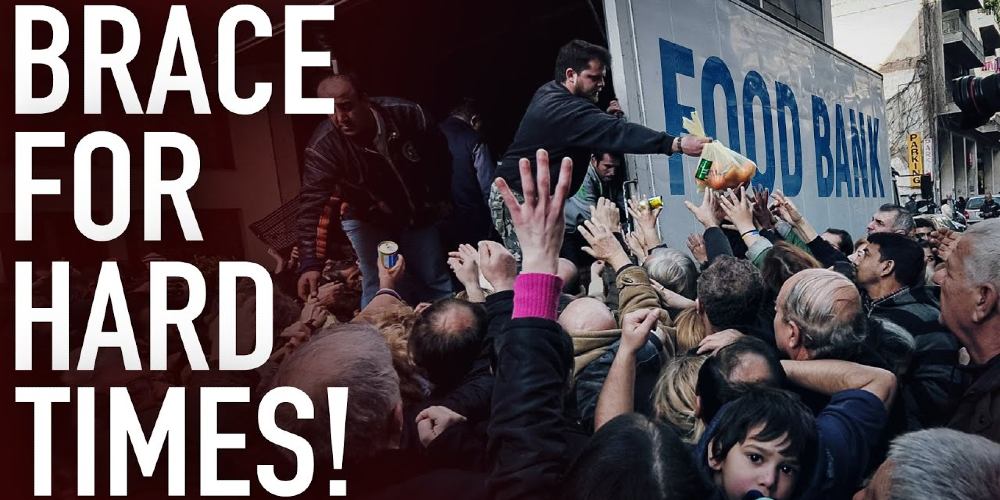Editor’s Commentary: We often pass on videos and articles by Epic Economist for various reasons. Sometimes, they’re spot on with their analysis. Other times they’re a bit too “click-baity” with not enough useful information to justify publishing their often-outrageous headlines.
I came very close to passing on today’s video/article because it delves into fearmongering. While there are clearly reasons for being concerned about the direction of our nation, the failing economy, geopolitical threats, and our own anti-American leaders driving the country into the ground, it’s difficult to imagine people needing to hunt rabbits like Elmer Fudd (though hopefully with more success) because otherwise their families will starve to death.
Then, I remembered something that I often tell others. “Just because something would have been unimaginable a couple of years ago doesn’t mean it’s not a certainty to happen today.”
No, I do not think it’s a certainty that we will be driven into something as bad if not worse than the Great Depression in which the masses are fighting over ketchup packets to survive, but it would be imprudent to think that’s impossible. That’s why I decided to publish today’s AI-voice-driven Epic Economist fearmonger piece. We can hope they’re wrong. We can do what we can to prepare. But at the end of the day we might find ourselves eating squirrel or nothing at all so it’s better to err on the side of caution. Here’s Epic Economist…
On October 29, 1929, the U.S. stock market faced a devastating crash that resulted in the crisis that we know today as the Great Depression. During that period, millions of Americans lost their jobs, their incomes, and their homes, and countless families faced homelessness and hunger.
Some people survived because they started to plant their fruits and vegetables and raise animals to make their meals. But for many others, that wasn’t an option so they had to improvise with the ingredients they had available. Back then, the vast majority of Americans had to stretch every dollar and pinch every penny to get the most food for their buck.
Conditions were so extreme that desperate people started to do things that would be unthinkable during normal times just to have something on their plate. For instance, while some people only did this when it was roadkill, others actually hunted squirrels to eat.
Those were times when panic and desperation were rapidly spreading through our society, and some Americans had to fight to survive. Eating squirrels was not uncommon in the 30s. Beef was out of the reach of many struggling households, and chickens were kept alive so they could provide eggs, so options were limited.
People hunted, foraged, and learned to make the best of what they had on hand. Canned goods, flour, eggs, and milk sometimes were all families had, and still, they created many different recipes with humble food staples. Those who could eat twice a day were the lucky ones. Poor families only had one meal per day, and parents went hungry at nighttime so they could feed their children.
Even though this happened almost one century ago, the struggles of that time are still in the nation’s memory, especially because current economic conditions are becoming eerily similar to what happened in the late 1920s and at the beginning of the 1930s. Today, we have the most overvalued stock market in history.
The housing market is falling apart, with commercial properties setting off the downfall, the economy is slumping while consumer prices are still soaring, and thousands of companies have already announced mass layoffs this year.
To say that life has changed dramatically in the past few years is an understatement. For those who are fortunate enough to still have jobs, making ends meet is no more an issue than normal. But for those who have lost their income entirely, from now on, money will be a bigger problem than ever before. This, however, is not the only burden Americans are facing right now. Grocery stores and big-box retailers are reporting empty shelves for several staples once again, and every time we go shopping, prices are up again.
Although we genuinely hope that our population doesn’t reach the same levels of despair and financial ruin that American families faced during the Great Depression, there plenty of statistics indicating that we are headed to a historic downturn. That’s why we must learn from history, and get ready for the hardships before they reach us.
Even the UN is warning that a Depression-era famine will happen again, so preparing for the next economic and financial disaster is definitely a matter of survival. For that reason, we compiled some recipes that our parents, grandparents, or great-grandparents made back then out of nearly nothing.
The List
- Squirrel
- Desperation Pie
- Chicken Feet in Broth
- Meatless Meatloaf
- Garbage Mashup
- Ketchup, Mayonnaise, Onion, or Pickle Sandwich
- Mlikorno
- Egg Drop Soup (1930s version)
- Cooked Break
- Shoo-Fly Pie
- Navy Bean and Ham Soup
- Frozen Fruit Salad
- Spaghetti With Boiled Carrots and White Sauce
- Buttermilk Soup
- Johnny Cakes
- Potato Candy
- Stuffed Artichokes
- No-Toppings Pizza
- Poorman’s Pudding
- Rabbit Stew and Dumplings





